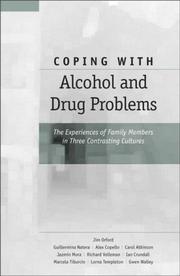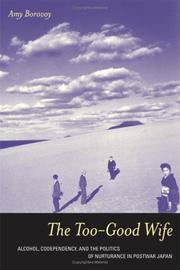| Listing 1 - 10 of 14 | << page >> |
Sort by
|
Book
ISBN: 0585107815 9780585107813 Year: 1986 Publisher: Carbondale Southern Illinois University Press
Abstract | Keywords | Export | Availability | Bookmark
 Loading...
Loading...Choose an application
- Reference Manager
- EndNote
- RefWorks (Direct export to RefWorks)
Alcoholics --- Social Welfare & Social Work --- Social Sciences --- Substance Abuse --- Alcoholism --- Drinkers, Problem --- Drunkards --- Drunks --- Inebriates --- Problem drinkers --- Addicts --- Case studies. --- Case studies --- Patients --- Alcoholics Anonymous
Book
ISBN: 088868746X 1770524886 0888684010 9781770524880 9780888684011 9781770524903 1770524908 9780888687463 9780888687456 Year: 2009 Publisher: Toronto [Ont.] Centre de toxicomanie et de santé mentale
Abstract | Keywords | Export | Availability | Bookmark
 Loading...
Loading...Choose an application
- Reference Manager
- EndNote
- RefWorks (Direct export to RefWorks)
Toxicomanes --- Alcooliques --- Joueurs (Jeux de hasard) --- Drug addicts --- Alcoholics --- Gamblers --- Gambling --- Alcoholism --- Drinkers, Problem --- Drunkards --- Drunks --- Inebriates --- Problem drinkers --- Addicts --- Druggies --- Junkies (Drug addicts) --- Narcotic addicts --- Drug abusers --- Counseling --- Counseling of --- Patients
Book
ISBN: 1282540998 9786612540998 008092476X 0124967361 9780124967366 9780080924762 Year: 2010 Publisher: Amsterdam ; Boston : Academic Press/Elsevier,
Abstract | Keywords | Export | Availability | Bookmark
 Loading...
Loading...Choose an application
- Reference Manager
- EndNote
- RefWorks (Direct export to RefWorks)
The book includes an examination of sources of law important to addiction and its treatment. The foundations for forensic work in professional legal testimony is explored (e.g., legal system, case law precedent, statutes governing addictions, civil and criminal procedures). The science of addiction is featured including the biology of addiction, addiction as a brain disease, responsibility vs. loss of control, development of addictions, and the role of genetics and environment. Drug testing, its uses with forensic populations, what the tests show and do not show, controversies in using tests
Drug abuse --- Alcoholism --- Drug addicts --- Alcoholics --- Substance abuse --- Law and legislation. --- Legal status, laws, etc. --- Treatment. --- Drinkers, Problem --- Drunkards --- Drunks --- Inebriates --- Problem drinkers --- Addicts --- Addiction to alcohol --- Alcohol abuse --- Alcohol intoxication --- Dipsomania --- Drinking problem --- Drunkenness --- Inebriety --- Intemperance --- Intoxication --- Jellinek's disease --- Liquor problem --- Temperance --- Controlled drinking --- Drinking of alcoholic beverages --- Criminal law --- Patients --- Intoxication, Alcohol

ISBN: 1846427061 1417504455 9781417504459 9781846427060 1843100029 Year: 2001 Publisher: Philadelphia Jessica Kingsley Publishers
Abstract | Keywords | Export | Availability | Bookmark
 Loading...
Loading...Choose an application
- Reference Manager
- EndNote
- RefWorks (Direct export to RefWorks)
This practical book shows how client-focused counselling can support problem drinkers seeking to develop and sustain a less alcohol-centred way of life. Supported by contributions from clients who have undergone counselling for alcohol reliance, this is a comprehensive for people working with those who have a problematic relationship with alcohol.
Alcoholics --- Alcoholism --- Behavior modification. --- Client-centered psychotherapy. --- Client-centered counseling --- Client-centered therapy --- Counseling, Client-centered --- Counseling, Nondirective --- Counseling, Person-centered --- Nondirective counseling --- Nondirective psychotherapy --- Nondirective therapy --- Person-centered counseling --- Person-centered psychotherapy --- Rogerian psychotherapy --- Psychotherapy --- Behavioral assessment --- Behaviorism (Psychology) --- Conditioned response --- Human behavior --- Learning, Psychology of --- Psychology, Applied --- Drinkers, Problem --- Drunkards --- Drunks --- Inebriates --- Problem drinkers --- Addicts --- Counseling of. --- Psychological aspects. --- Psychology --- Patients

ISBN: 0203759605 1283967952 1134702663 9781134702664 9780203759608 9780203759608 0415371465 9780415371469 9781134702800 1134702809 9781134702732 1134702736 9780415647038 0415647037 Year: 2005 Publisher: London New York Routledge
Abstract | Keywords | Export | Availability | Bookmark
 Loading...
Loading...Choose an application
- Reference Manager
- EndNote
- RefWorks (Direct export to RefWorks)
What difference does culture make?Coping with Alcohol and Drug Problems: The Experiences of Family Members in Three Contrasting Cultures aims to deepen and extend understanding of the experiences of family members trying to cope with the excessive drinking or drug taking of a relative. Comprehensive and thoroughly up to date, this book draws on the results of the cross-cultural study of alcohol and drug problems in the family, and places these results within the broader context of the international literature on the subject. By investigating the simil
Alcoholism --- Alcoholics --- Drug abuse --- Drug addicts --- Druggies --- Junkies (Drug addicts) --- Narcotic addicts --- Addicts --- Drug abusers --- Drug use --- Substance abuse --- Drinkers, Problem --- Drunkards --- Drunks --- Inebriates --- Problem drinkers --- Addiction to alcohol --- Alcohol abuse --- Alcohol intoxication --- Dipsomania --- Drinking problem --- Drunkenness --- Inebriety --- Intemperance --- Intoxication --- Jellinek's disease --- Liquor problem --- Temperance --- Controlled drinking --- Drinking of alcoholic beverages --- Family relationships --- Patients --- Intoxication, Alcohol
Book
ISBN: 1501707051 150170706X 9781501707063 9781501703126 1501703129 9781501703133 1501703137 9781501707056 Year: 2016 Publisher: Cornell University Press
Abstract | Keywords | Export | Availability | Bookmark
 Loading...
Loading...Choose an application
- Reference Manager
- EndNote
- RefWorks (Direct export to RefWorks)
Critics of narcology-as addiction medicine is called in Russia-decry it as being "backward," hopelessly behind contemporary global medical practices in relation to addiction and substance abuse, and assume that its practitioners lack both professionalism and expertise. On the basis of his research in a range of clinical institutions managing substance abuse in St. Petersburg, Eugene Raikhel increasingly came to understand that these assumptions and critiques obscured more than they revealed. Governing Habits is an ethnography of extraordinary sensitivity and awareness that shows how therapeutic practice and expertise is expressed in the highly specific, yet rapidly transforming milieu of hospitals, clinics, and rehabilitation centers in post-Soviet Russia. Rather than interpreting narcology as a Soviet survival or a local clinical world on the wane in the face of globalizing evidence-based medicine, Raikhel examines the transformation of the medical management of alcoholism in Russia over the past twenty years.Raikhel's book is more than a story about the treatment of alcoholism. It is also a gripping analysis of the many cultural, institutional, political, and social transformations taking place in the post-Soviet world, particularly in Putin's Russia. Governing Habits will appeal to a wide range of readers, from medical anthropologists, clinicians, to scholars of post-Soviet Russia, to students of institutions and organizational change, to those interested in therapies and treatments of substance abuse, addiction, and alcoholism.
Alcoholics --- Alcoholism --- Post-communism --- Postcommunism --- World politics --- Communism --- Addiction to alcohol --- Alcohol abuse --- Alcohol intoxication --- Dipsomania --- Drinking problem --- Drunkenness --- Inebriety --- Intemperance --- Intoxication --- Jellinek's disease --- Liquor problem --- Substance abuse --- Temperance --- Controlled drinking --- Drinking of alcoholic beverages --- Drinkers, Problem --- Drunkards --- Drunks --- Inebriates --- Problem drinkers --- Addicts --- Institutional care --- Treatment --- Hospitals --- Health aspects --- Patients --- Intoxication, Alcohol
Book
ISBN: 1935049747 9781935049746 9781935049487 1935049488 Year: 2012 Publisher: Boulder, Colo. FirstForumPress
Abstract | Keywords | Export | Availability | Bookmark
 Loading...
Loading...Choose an application
- Reference Manager
- EndNote
- RefWorks (Direct export to RefWorks)
Judith Grant explores the experiences of men who grapple with drug and alcohol abuse, illuminating the interplay between individual identity and social environment that shapes the processes of addiction and recovery. Grant draws on the voices of the men themselves as she traces and analyzes their paths to both addiction and desistance. Documenting the full sweep of their journeys, she also highlights the critical differences and similarities in the experiences of men and women.
Drug addicts --- Men --- Alcoholics --- Druggies --- Junkies (Drug addicts) --- Narcotic addicts --- Addicts --- Drug abusers --- Alcoholism --- Drinkers, Problem --- Drunkards --- Drunks --- Inebriates --- Problem drinkers --- Human males --- Human beings --- Males --- Effeminacy --- Masculinity --- Rehabilitation --- Substance use --- Patients --- Drug addicts -- Rehabilitation -- United States. --- Men -- Substance use -- United States. --- Alcoholics -- United States. --- Drug addicts -- United States. --- Alcoholics -- Rehabilitation -- United States.
Book
ISBN: 0429897464 0429472692 1782414282 9781782414285 9781781815601 1781815607 1782203125 9781782203124 9780429472695 9780429925924 0429911696 Year: 2015 Publisher: London, United Kingdom Karnac Books
Abstract | Keywords | Export | Availability | Bookmark
 Loading...
Loading...Choose an application
- Reference Manager
- EndNote
- RefWorks (Direct export to RefWorks)
""Show me a drunk and I'll show you someone in search of God", is a saying that could be derived from Carl Jung. Jung wrote to Bill Wilson, founder of Alcoholics Anonymous (A.A.), about his understanding of Rowland Hazard's alcoholism: "His craving for alcohol was the equivalent, on a low level, of the spiritual thirst of our being for wholeness, expressed in medieval language: the union with God".The author visited the archives of the headquarters of A.A. in New York, and discovered new communications between Carl Jung and Bill Wilson. For the first time this correspondence shows Jung's respect for A.A. and in turn, its influence on him. In particular, this research shows how Bill Wilson was encouraged by Jung's writings to promote the spiritual aspect of recovery as opposed to the conventional medical model which has failed so abysmally.The book overturns the long-held belief that Jung distrusted groups. Indeed, influenced by A.A.'s success, Jung gave "complete and detailed instructions" on how the A.A. group format could be developed further and used by "general neurotics".Wilson was an advocate of treating some alcoholics with LSD in order to deflate the ego and induce a spiritual experience. He wrote to Jung for his comments on this controversial idea. Jung was stridently opposed to "short cuts", to transcendent experiences; however he died before he could reply to Wilson's comprehensive letter.The author explains how alcoholism can be diagnosed and understood by professionals and the lay person; by examining the detailed case histories of Jung, the author gives graphic examples of its psychological and behavioural manifestations.By combining the narratives of recovering alcoholics with a Jungian perspective, the author explains how the program of the 12 steps can lead to a journey of spiritual awakening or in Jungian terms, individuation. This book explains in plain words the language of A.A. and takes the reader inside a meeting to show how it works in practice.The final chapter deals with the criticism that both organisations have "cultish" aspects."--Provided by publisher.
Alcoholics --- Alcoholism --- Drinkers, Problem --- Drunkards --- Drunks --- Inebriates --- Problem drinkers --- Addicts --- Rehabilitation --- History --- Patients --- Jung, C. G. --- Fox, Emmet. --- Alexander, Jack, --- Jung, Karl Gustav, --- I︠U︡nh, Karl Hustav, --- Jung, Carl Gustav, --- Yung, Ḳ. G. --- Yungu, C. G. --- I︠U︡ng, Karl Gustav, --- יונג, קרל גוסטאב --- יונג, קרל גוסטב --- יונג, ק. ג. --- 榮格, --- C. G. ユング, --- Yūng, Kārl Gustāv, --- يونگ، کارل گستاو --- Alcoholics Anonymous --- History. --- Jung, Carl Gustav
Book
ISBN: 1282360701 9786612360701 052094240X 9780520942400 0520253523 9780520253520 Year: 2008 Publisher: CA University of California Press
Abstract | Keywords | Export | Availability | Bookmark
 Loading...
Loading...Choose an application
- Reference Manager
- EndNote
- RefWorks (Direct export to RefWorks)
Since its first publication in 1920, George Saintsbury's classic Notes on a Cellar-Book has remained one of the greatest tributes to drink and drinking in the literature of wine. A collection of tasting notes, menus, and robust opinions, the work is filled with anecdotes and recollections of wines and spirits consumed-from the heights of Romanée-Conti to the simple pleasures of beer, flip, and mum. Thomas Pinney brings this unique work alive for contemporary audiences by providing the keys to a full understanding of Notes on a Cellar-Book in a new edition that includes explanatory endnotes, an essay on the book's legacy, and additional articles on wine by Saintsbury.
Wine and wine making. --- Liquors. --- Menus. --- Bills of fare --- Fare, Bills of --- Cooking --- Dinners and dining --- Distilled beverages --- Drinks --- Intoxicants --- Spirits, Alcoholic --- Spirituous liquors --- Alcoholic beverages --- Brewing --- Distillation --- Enology --- Oenology --- Vinification --- Wines --- Grape products --- Fruit wines --- Viticulture --- Wine and wine making --- Liquors --- Menus --- Vin et vinification --- Eaux-de-vie --- 1920. --- 20th century. --- alcohol lovers. --- alcohol. --- anecdotes. --- annotated. --- articles. --- beer. --- classic notes. --- coffee table books. --- comparisons. --- contemporary version. --- discussion books. --- drinkers. --- drinking books. --- drinking tribute. --- easy to read. --- end notes. --- engaging. --- essays. --- food and wine books. --- food wine. --- men and women. --- menus. --- modern readers. --- nonfiction. --- spirits. --- tasting notes. --- tribute to wine. --- wine culture. --- wine drinkers. --- wine history. --- wine literature. --- wine lovers.

ISBN: 9786612358098 1423731468 128235809X 0520938682 159875808X 9780520938687 9781423731467 9781598758085 0520244516 9780520244511 0520244524 9780520244528 9781282358096 6612358092 Year: 2005 Publisher: Berkeley University of California Press
Abstract | Keywords | Export | Availability | Bookmark
 Loading...
Loading...Choose an application
- Reference Manager
- EndNote
- RefWorks (Direct export to RefWorks)
Social drinking is an accepted aspect of working life in Japan, and women are left to manage their drunken husbands when the men return home, restoring them to sobriety for the next day of work. In attempting to cope with their husbands' alcoholism, the women face a profound cultural dilemma: when does the nurturing behavior expected of a good wife and mother become part of a pattern of behavior that is actually destructive? How does the celebration of nurturance and dependency mask the exploitative aspects not just of family life but also of public life in Japan? The Too-Good Wife follows the experiences of a group of middle-class women in Tokyo who participated in a weekly support meeting for families of substance abusers at a public mental-health clinic. Amy Borovoy deftly analyzes the dilemmas of being female in modern Japan and the grace with which women struggle within a system that supports wives and mothers but thwarts their attempts to find fulfillment outside the family. The central concerns of the book reach beyond the problem of alcoholism to examine the women's own processes of self-reflection and criticism and the deeper fissures and asymmetries that undergird Japanese productivity and social order.
Wives --- Sex role --- Social work with women --- Codependency --- Parents of drug addicts --- Alcoholics' spouses --- Alcoholics --- Spouses --- Women --- Housewives --- Married women --- Gender role --- Sex (Psychology) --- Sex differences (Psychology) --- Social role --- Gender expression --- Sexism --- Co-alcoholism --- Co-dependence (Psychology) --- Co-dependency --- Codependence --- Codependent behavior --- Psychology, Pathological --- Parents of narcotic addicts --- Drug addicts --- Alcoholics' wives --- Alcoholism --- Drinkers, Problem --- Drunkards --- Drunks --- Inebriates --- Problem drinkers --- Addicts --- Family relationships --- Patients --- Family relationships. --- Gender roles --- Gendered role --- Gendered roles --- Role, Gender --- Role, Gendered --- Role, Sex --- Roles, Gender --- Roles, Gendered --- Roles, Sex --- Sex roles --- alcohol. --- alcoholics. --- alcoholism. --- codependency. --- codependent relationships. --- cultural issues. --- destructive behavior. --- drunkenness. --- enabling. --- family life. --- family relationships. --- gender issues. --- gender norms. --- japan. --- japanese culture. --- japanese women. --- marriage. --- men and women. --- mental health issues. --- middle class. --- nurturance. --- politics of marriage. --- postwar japan. --- public life. --- sobriety. --- social drinking. --- social order. --- substance abuse. --- tokyo. --- wives and mothers. --- wives. --- womens roles.
| Listing 1 - 10 of 14 | << page >> |
Sort by
|

 Search
Search Feedback
Feedback About UniCat
About UniCat  Help
Help News
News